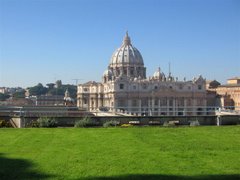
Defying dreary weather and drearier protests, the state visit of Benedict XVI to England and Scotland was, by all accounts, a smashing success. Although only about 5 million of 60 Britons are Catholic, the enthusiasm of the crowds bowled over a sceptical media.
London’s saucy tabloids ran interviews with star-struck teenagers under punning headlines like “Bene’s from Heaven”. One young woman gushed to the News of the World, "English Catholicism needs a bit of oomph and this is our chance to give it some welly. I have got a feeling that I've not had for a long time. He should come more often."
No doubt the Pope appreciated the devoted crowds, but he had come with a message, not an applause meter. British Prime Minister David Cameron picked that up. In his farewell remarks, he thanked the Pope for raising searching questions. “You have really challenged the whole country to sit up and think, and that can only be a good thing.”
Think about what?
Five themes impressed me about Benedict’s subtle and subdued addresses.
Remember 1066 and all that. Even in Britain it’s easy to forget how yoked we are to our past. Voldemort Dawkins and his disciples seemed unaware of how much they owed to generations of anti-popery campaigners. Different costumes, same script.
Benedict, on the other hand, has a knack for placing messages in an historical framework. In Westminster Hall, he said, “The angels looking down on us from the magnificent ceiling of this ancient Hall remind us of the long tradition from which British Parliamentary democracy has evolved. They remind us that God is constantly watching over us to guide and protect us. And they summon us to acknowledge the vital contribution that religious belief has made and can continue to make to the life of the nation.”
Britain, he reminded his hosts time and time again, is incomprehensible without its faith. Even its first history was penned by a Saxon monk, Bede the Venerable. “The Christian message has been an integral part of the language, thought and culture of the peoples of these islands for more than a thousand years. Your forefathers’ respect for truth and justice, for mercy and charity come to you from a faith that remains a mighty force for good in your kingdom, to the great benefit of Christians and non-Christians alike.”
In short, democratic values of freedom, equality and solidarity have Christian roots. The greatest triumph of British democracy in the 19th century, the abolition of the slave trade, was due to the work of reformers like William Wilberforce and David Livingstone, both staunch Christians.
And, taking a leaf from the tormented history of his own homeland, Benedict reminded listeners that atheist regimes, like the slavers, denied a common humanity to Jews and other subject peoples. “As we reflect on the sobering lessons of the atheist extremism of the twentieth century, let us never forget how the exclusion of God, religion and virtue from public life leads ultimately to a truncated vision of man and of society and thus to a ‘reductive vision of the person and his destiny’.”
What lies ahead if secularism erases religion from civic life?
Reason and faith are compatible. Benedict could easily have side-stepped the enormous tensions of this trip. Nowadays beatifications are normally proclaimed by local bishops. But the life and work of Cardinal Newman offered him an opportunity to take the battle against aggressive secularism into enemy territory. Without ever mentioning He-Who-Must-Not-Be-Named, he pounded his contention that “There is no logical pathway from atheism to wickedness.”
A schoolboy knowledge of the 20th century shows how dumboundingly daft that is but Benedict put it more eloquently:
“Without the corrective supplied by religion, though, reason … can fall prey to distortions, as when it is manipulated by ideology, or applied in a partial way that fails to take full account of the dignity of the human person. Such misuse of reason, after all, was what gave rise to the slave trade in the first place and to many other social evils, not least the totalitarian ideologies of the twentieth century. This is why I would suggest that the world of reason and the world of faith – the world of secular rationality and the world of religious belief – need one another and should not be afraid to enter into a profound and ongoing dialogue, for the good of our civilization.”
Young people need challenging ideals. The last 40 years have thrown a soggy blanket of booze and sex over youthful idealism and generosity. One of the leaders in the Pope’s Unwelcome Committee, the Commissar of the British secularist commentariat, Polly Toynbee, exemplified this in a recent column when she wrote that repression of “sex lies at the poisoned heart of all that is wrong with just about every major faith”. What Jack and Jill need is more safe sex, in other words.
Benedict, on the other hand, offered young Britons the demanding challenge of creating a civilisation of love, rather than a civilisation of indulgence. “There are many temptations placed before you every day - drugs, money, sex, pornography, alcohol - which the world tells you will bring you happiness, yet these things are destructive and divisive. There is only one thing which lasts: the love of Jesus Christ personally for each one of you.”
The Pope has a vision of life as demanding commitment to dignity, friendship, wisdom and truth – like John Henry Newman – instead of the frantic pursuit of “the glittering but superficial existence frequently proposed by today’s society”. The eruption of petulant nastiness in the media before the visit made a shabby contrast with the Pope’s invitation to reach for the stars.
Religion has a place in the public square. Nowhere in the Western world is religion more on the back foot than in Britain. But as Prime Minister Cameron pointed out, Christianity is challenging: “For you have offered a message not just to the Catholic Church but to each and every one of us of every faith and none. A challenge to us all to follow our conscience to ask not what are my entitlements, but what are my responsibilities? To ask not what we can do for ourselves, but what we can do for others?”
Faith has a role in political life, Benedict insisted. Politics is not just a matter of administrative effectiveness or balancing interests, but of ethics. “Substantially politics came into being in order to guarantee justice, and with justice, freedom. Now justice is a moral value, a religious value, and hence faith, the proclamation of the Gospel, is linked to politics at the point of ‘justice’, and from here are born common interests.”
The 20th century has shown that that governments are constantly tempted to tyranny. It is faith that protects citizens from being swallowed up by Leviathan:
“Each generation, as it seeks to advance the common good, must ask anew: what are the requirements that governments may reasonably impose upon citizens, and how far do they extend? By appeal to what authority can moral dilemmas be resolved? These questions take us directly to the ethical foundations of civil discourse. If the moral principles underpinning the democratic process are themselves determined by nothing more solid than social consensus, then the fragility of the process becomes all too evident - herein lies the real challenge for democracy.”
The foundation for tolerance is respect, not relativism. The Pope’s critics accuse him of being deaf to dialogue but they were in no mood for dialogue themselves last weekend. He-Who-Must-Not-Be-Named told a rally of supporters that he was “a leering old fixer” and “an enemy of humanity, of children, of gay people, of women, of the poorest people on the planet, of truth, of science, of education”. Isn’t Britain’s Pope of atheism capable of civility or tolerance?
By contrast, Benedict pulled no punches but gave no offence. In Westminster Hall he reminded the great and good of British society that Thomas More had been martyred for his loyalty to Rome. In Lambeth Palace, the residence of the Anglican Primate, he made a veiled reference to the ordination of homosexuals and women and Newman’s conversion from the Anglican Church. In Westminster Abbey, he described himself as the successor of Peter. He met Muslim leaders and alluded to the lack of religious freedom in Muslim-majority countries. Everywhere he spoke with courtesy and respect and without insolence or irony. But everywhere he sought out common ground for promoting human dignity and religious freedom.
More with deeds than with words he gave a memorable lesson in tolerance. On the one hand, it is not forbearance, or ignoring points of difference. On the other it is not minimising differences as if they did not matter. Benedict showed that tolerance is possible without being a relativist. Is it because he is sure that reason will ultimately triumph that he has the courage to dialogue?
Read the speeches yourself. It is not for nothing that MercatorNet nominated Joseph Ratzinger as one of the great champions of human dignity.
By: Michael Cook is editor of MercatorNet.




No comments:
Post a Comment